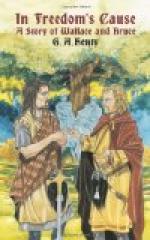Wallace’s hearers were all in tears at his decision, but they felt that there was truth in his words, that the Scottish nobles were far more influenced by feelings of personal jealousy and pique than by patriotism, and that so long as Wallace remained the guardian of Scotland they would to a man side with the English. The next day Wallace assembled all his followers, and in a few words announced his determination, and the reasons which had driven him to take it. He urged them to let no feelings of resentment at the treatment he had experienced, or any wrath at the lukewarmness and treachery which had hitherto marked the Scottish nobles, overcome their feeling of patriotism, but to follow these leaders should they raise the banner of Scotland, as bravely and devotedly as they had followed him.
Then he bade them farewell, and mounting his horse rode to the seacoast and passed over to France.
Although he had retired from Scotland, Wallace did not cease from war against the English; but being warmly received by the French king fought against them both by sea and land, and won much renown among the French.
After returning to England, Edward, finding that the Scottish leaders still professed to recognize Baliol as king, sent him to the pope at Rome, having first confiscated all his great possessions in England and bestowed them upon his own nephew, John of Brittany; and during the rest of his life Baliol lived in obscurity in Rome. A portion of the Scotch nobles assembled and chose John Comyn of Badenoch and John de Soulis as guardians of the kingdom. In the autumn of the following year Edward again assembled a great army and moved north, but it was late; and in the face of the approaching winter, and the difficulty of forage, many of the barons refused to advance. Edward himself marched across the Border; but seeing that the Scots had assembled in force, and that at such a season of the year he could not hope to carry his designs fully into execution, he retired without striking a blow. Thereupon the castle of Stirling, which was invested by the Scots, seeing no hope of relief, surrendered, and Sir William Oliphant was appointed governor.




